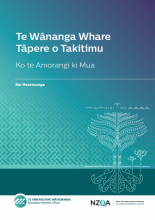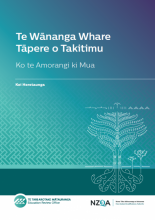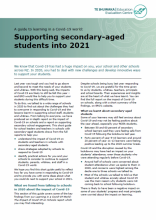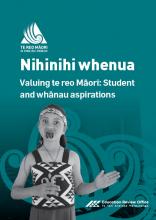- Topics: Evaluation indicators, Integrated schools, Ongoing education, Secondary, Te Pou Mataaho | Evaluation and Research Māori
- Published: 10 May 2021
Exploring Collaboration in Action: Kahukura Community of Practice
ERO was approached by principals from Kahukura to document and evaluate their community of practice in Christchurch. This report identifies what is working well for this community of practice, areas where they might consider further enhancements, and lessons and insights into practices which could be shared with others.
- Published: 10 May 2021
Collaboration in Action: Lessons from a Community of Practice
This short report accompanies our report Exploring Collaboration in Action: Kahukura Community of Practice. It looks at the lessons that can be learnt from the Kahukura community of practice, drawing out key lessons on collaboration and providing seven key implications for schools who are interested in collaborating to consider.
- Published: 22 Apr 2021
Science in secondary schools: a guide for leaders
To support leaders and teachers to review and strengthen the science learning opportunities they provide, ERO explored the strategies and approaches that a selection of schools had taken to increase students’ engagement in science. This short guides draws on this work to help secondary school leaders think about how they can support stronger science teaching and learning in their school.
- Published: 21 Apr 2021
Science in secondary schools: a guide for teachers
To support leaders and teachers to review and strengthen the science learning opportunities they provide, ERO explored the strategies and approaches that a selection of schools had taken to increase students’ engagement in science. This short guides draws on this work to help secondary school teachers think about how they can support stronger science teaching and learning in their school.
- Published: 20 Apr 2021
Science in primary schools: a guide for leaders
To support leaders and teachers to review and strengthen the science learning opportunities they provide, ERO explored the strategies and approaches that a selection of schools had taken to increase students’ engagement in science. This short guides draws on this work to help primary school leaders think about how they can support stronger science teaching and learning in their school.
- Published: 19 Apr 2021
Science in primary schools: a guide for teachers
To support leaders and teachers to review and strengthen the science learning opportunities they provide, ERO explored the strategies and approaches that a selection of schools had taken to increase students’ engagement in science. This short guides draws on this work to help primary school teachers think about how they can support stronger science teaching and learning in their school.
- Published: 12 Apr 2021
Science in New Zealand schools and early childhood services - series summary
Science is important – we rely on science and scientific thinking in almost every endeavour in our modern society. High quality science education at school is essential for learners who want a career in science, but it is also important for all learners to help them understand the scientific issues that whānau, communities, and nations face. Issues such as climate change, healthy living, and innovation all depend on science.
- Published: 19 Jan 2021
Learning in a Covid-19 World: Supporting Secondary School Engagement
This report explains strategies for supporting secondary students’ engagement during the Covid‑19 pandemic. These strategies include re-engaging students who present with wellbeing concerns or show signs of disengagement. The report also includes some innovative actions schools used to promote student engagement after the first lockdown in 2020.
- Published: 19 Jan 2021
A guide to learning in a Covid-19 world - Supporting secondary-aged students into 2021
This short guide is for school leaders and teachers in schools with secondary-aged students. It covers what we found from talking to schools in 2020 about the impact of Covid-19, and shares strategies used by schools to respond to the challenges they faced. It also sets out some actions that could be considered for continuing to support students, parents, whānau and staff in 2021.
- Published: 19 Jan 2021
Te Kahu Whakahaumaru – Ngā mahi a te rangai mātauranga Māori (English)
Te Pou Mataaho, ERO’s evaluation and research group, and Te Uepū ā Motu, ERO’s national evaluation and review team, pursued this evaluation to provide an evidence base about the initial impacts of Covid-19 on Māori-medium education and how the sector responded.
- Published: 19 Jan 2021
Te Kahu Whakahaumaru – Ngā mahi a te rangai mātauranga Māori (Māori)
I whāia tēnei arotake e Te Pou Mataaho, te rōpū arotake, rangahau hoki a Te Tari Arotake Mātauranga me Te Uepū ā-Motu, te rōpū arotake ā-motu a Te Tari Arotake Mātauranga, ki te whakaputa i tētahi kohinga taunakitanga e kitea ai ngā pānga tōmua o te Mate Korona ki te rāngai mātauranga reo Māori, me ngā rautaki i whāia ai e taua rāngai.
- Published: 10 Dec 2020
Te Kahu Whakahaumaru: Māori continue to show resilience across Māori-medium education
In Aotearoa, Māori-medium education experienced significant disruption when the outbreak of Covid-19 forced kura to close their doors, and whānau and kaiako to adjust to home schooling and distance learning. Among the many challenges were access to technology and resources with Māori communities among the most affected.
- Published: 10 Dec 2020
E whakatinana tonu nei te rāngai mātauranga reo Māori i te manawanui
I Aotearoa nei, i tino raru te rāngai mātauranga reo Māori i te horapatanga o te Mate Korona, i kati ai ngā tatau o ngā kura, i mate ai hoki ngā whānau me ngā kaiako ki te tīni i ā rātou mahi ki te whakaako ki te kāinga me te ako tawhiti.
Ko tētahi raru i roto i te huhua, ko te korenga o ngā taputapu matihiko me ngā rauemi, ka mutu ko ngā hapori Māori ērā i rongo i te korekore rawa atu nei.
- Published: 15 Sep 2020
Nihinihi Whenua – Valuing te reo Māori: Student and whānau aspirations
This report provides a snapshot of student and whānau perspectives on the teaching of te reo Māori. It follows the June publication of Te Tāmata Huaroa, which provides a review of the current status of te reo Māori in English medium school settings.
- Published: 18 Jun 2020
Te Tāmata Huaroa: Te Reo Māori in English-medium Schooling
This report gives a snapshot of the current provision of te reo Māori teaching and learning in a representative sample of English-medium primary and secondary schools. The education sector is seen as an important lever in the Government’s Maihi Karauna strategy for language revitalisation.
- Published: 30 May 2018
What drives learning in the senior secondary school?
This evaluation studies effective practice in schools’ senior curriculum. It contributes to the review being undertaken by the Ministry of Education (the Ministry) of the National Certificate of Educational Achievement (NCEA). The Ministry-led review focuses on the implementation of NCEA as the national assessment system for the senior years of secondary schooling.
- Published: 04 Sep 2017
Building resilience and self efficacy
Students acknowledge the role leaders and teachers play in instilling in them the self-belief to become confident, connected, actively involved, life long learners
- Published: 04 Sep 2017
Leadership for equity and excellence
The senior leadership team are responsible for specific portfolios and work interdependently to realise the shared vision of equity and excellence for all.












